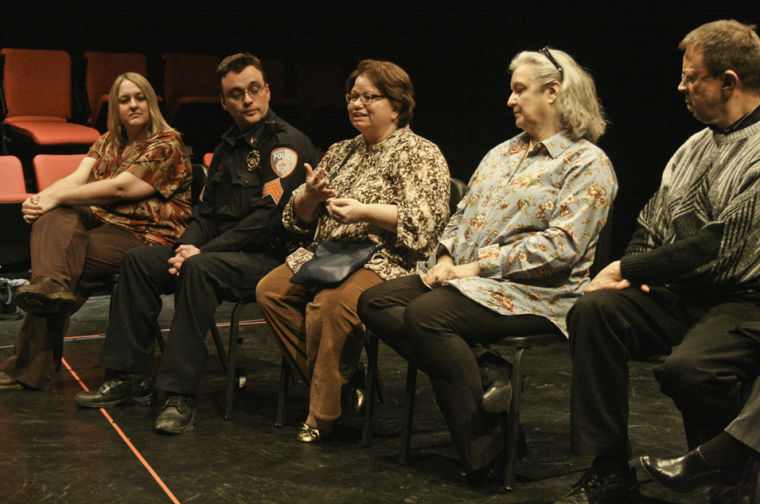Students were able to get more information about sexual assault Thursday night during a panel discussion and performance addressing the topic.
The Wellness Connection and the University Drug, Alcohol and Sexual Offenses Coalition hosted the event in April to honor Sexual Assault Awareness Month. It was meant to make students feel comfortable to report sexual assault or sexual offenses, said Brittany Roth, coordinator of the event and a graduate student at the University.
“Sexual Assault offenses are highly under-reported,” Roth said. “A lot of students don’t feel comfortable reporting it.”
The panel answered questions from the audience and offered information about sexual assault and how to report it.
The panel was made up of representatives from campus and community organizations, such as the University Police, the counseling center, the Sexual Assault and Awareness for Empowerment Center, the Women’s Center, the Wellness Connection, the Office of the Dean of Students and the Theatre and Film Department. Discussion and audience questions centered around how to report sexual assault, consent and resources on campus.
Sexual assault is an important issue to discuss on college campuses, said Faith Yingling, director of Wellness.
“Certainly this can happen to anyone, but we know that one in four college women during their college years will be sexually assaulted,” Yingling said. “It’s an important issue for college campuses.”
Students performed scenes from the play “Spring Awakening,” which will be performed by the Theatre and Film Department on April 18, 19, 20 and 21.
The scenes were related to issues of sexual assault and after the performance the audience was able to ask a panel more about sexual assault.
Michael Ellison, director of “Spring Awakening” and a panel member, approached the Wellness Connection about the play, which then collaborated with the University Drug, Alcohol and Sexual Offenses Coalition to create the panel discussion.
The play is about the sexual awakening of adolescents, Ellison said. The specific scenes from the play were selected for the panel event because they portray the confusion between what adolescents bodies are feeling and minds are telling them, Ellison said during the panel discussion.
“This panel discussion really reinforces the importance of doing works like this,” Ellison said.
The play being performed during sexual assault awareness month was a coincidence, Ellison said.
“We decided to do it because we believe it brings up a lot of important issues that need to be discussed,” Ellison said.
Yingling sat on the panel and said the scenes from the play set up themes for discussion, such as the issues of consent in cases of sexual assault.
One of the important issues the panel discussed was support, Yingling said. Control has been taken away from victims of sexual assault, so providing resources and information and letting them decide what they want to do is important, she said.
Regardless of the month, Ellison said it was important to him to approach the play responsibly.
“[We want] to inform the audience of the controversial issues involved, contribute to the healing process, to open up discussion about these subjects— rather than putting them out there and walking away,” Ellison said.














